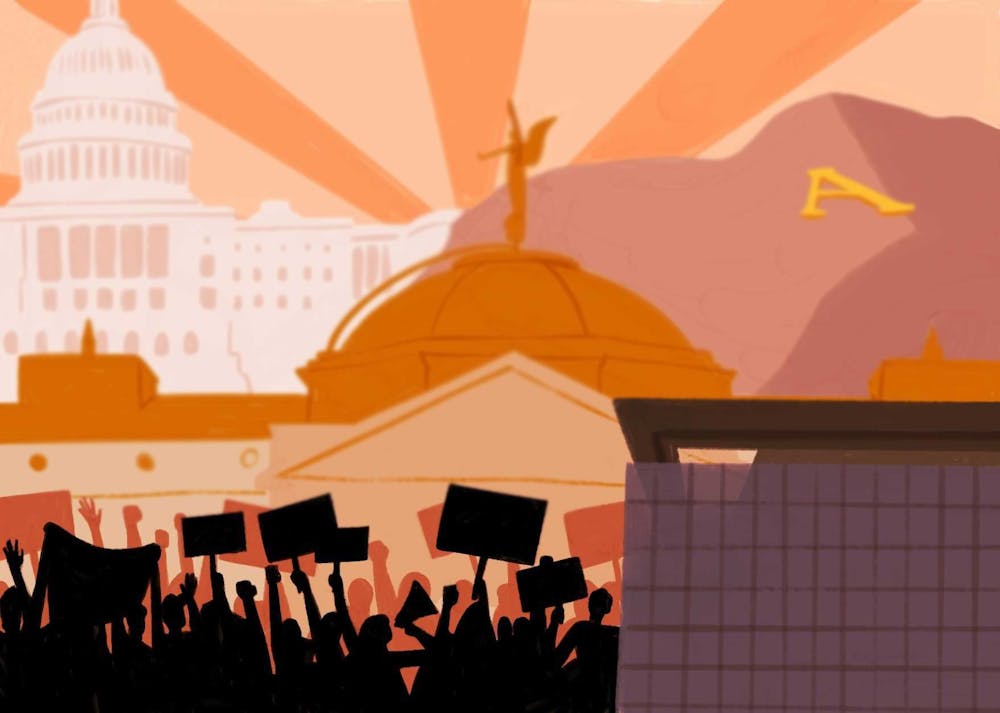Young people have historically had the lowest voter turnout rates. Often this is attributed to a lack of interest, however, it's not that simple.
While there are many contributing factors, one of the most significant today is the unique form of civic participation younger generations tend to favor: engaged citizenship.
Engaged citizenship is the practice of partaking in activist behaviors that aim to directly drive political and social change outside the confines of the electoral calendar. Examples include participating in protests, petitions and boycotts.
Engaged citizenship differs from duty-based citizenship, upon which the United States has built its political structure. Duty-based citizenship refers to the practices that traditionally come to mind when thinking about "model civic participation." Examples here are voting in elections, reporting crime and serving on a jury.
These two forms of citizenship are not exclusive. One can exhibit both, but as a general trend older people tend to be more inclined toward duty-based citizenship and younger people tend to favor engaged citizenship.
While both forms of citizenship are to be encouraged, there is a problem: this lack of affinity towards duty-based citizenship too often impedes the desires of younger generations.
Sure, petitions, protests and association lobbying can all make statements and bring attention to important issues. However, they are simply insufficient when it comes to bringing about the force of law. This points to why we must also engage in duty-based citizenship. We need to vote.
Fundamentally, the political structure in the United States is designed in such a way that voting is the most effective way for citizens to express and enact their political will. Consequently, the U.S. government is dominated by the views of the older population which turns out at a greater rate for elections.
Politicians appeal and cater to those who are going to cast a vote and put them in office. It follows, then, that as millennials and Gen Z, we will not see our views infused into government policy until we step into the voting booth in significantly greater numbers.
For evidence of this, look no further than the 2022 midterm elections. Younger voter turnout was the second highest for a midterm in the past 30 years and they broke hard for Democrats, even in swing states.
Traditionally young voters had a roughly 20% turnout rate for midterm elections. In the 2022 midterms, it hiked up to about 27%. This was a leading contributor to the notable lack of the expected "red wave."
Consider Arizona, which based on past voting patterns seemed as susceptible to a "red wave" as any state. Yet, this did not happen. Why not? Sure, the Republicans put up low-quality candidates. However, another major factor was the youth support for Democratic candidates.
Depending on the individual race, between 71% to 76% of the youth vote went Democratic. In fact, when Sen. Mark Kelly was asked at which point on election day he felt confident in his victory, he said, "When I saw the local news and they were reporting about the long lines at Arizona State University, like 30 minutes before the polls closed. I turned to somebody and said, 'We’re going to win.'"
The weight of the youth vote wasn't only felt in Arizona. Other key battleground states such as Pennsylvania, Nevada and Georgia had outcomes that were also highly dependent on younger voters. Even states where the Democratic candidates did not win felt the effects.
Look, for example, at Wisconsin, where Republican senate incumbent Ron Johnson had every reason to believe the expected "red wave" would return him to Washington. His race against Democratic challenger Mandela Barnes, however, was much closer than anyone had anticipated — largely due to the efforts of younger voters, 63% of whom were Democratic.
In the end, Barnes finished only 1% behind Johnson, a fact that teaches us two lessons. First, the youth vote is increasingly going to be a key factor in election outcomes. Second, a national 27% youth turnout is still not enough.
Interestingly, there is an opportunity for us to put our money where our mouth is in just a few weeks. In May, there will be a special election in Tempe. This election will either uphold or nullify the city council's decision to rezone large portions of land on Tempe Town Lake as "mixed-use" and initiate the construction of an entertainment district.
READ MORE: Tempe special election for Arizona Coyotes arena and entertainment district, explained
Many younger residents of Tempe have concerns as to how this will affect housing costs as well as sustainability efforts and the environmental consequences. But just expressing concern is not going to be enough. We need to ensure we mobilize and get out to vote. That is likely the only way our concerns will be seriously taken into account.
Ultimately, given the way the U.S. system is set up, engaged citizenship isn’t effective unless accompanied by duty-based citizenship. While millennials and Gen Z possess massive potential political power, until we cater to the system of government already in place we simply cannot make it cater to us.
Edited by Kate Duffy, Jasmine Kabiri and Grace Copperthite
Reach the columnist at natalieckerbel@gmail.com.
Editor's note: The opinions presented in this column are the author's and do not imply any endorsement from The State Press or its editors.
Want to join the conversation? Send an email to opiniondesk.statepress@gmail.com. Keep letters under 500 words and be sure to include your university affiliation. Anonymity will not be granted.
Like The State Press on Facebook and follow @statepress on Twitter.




